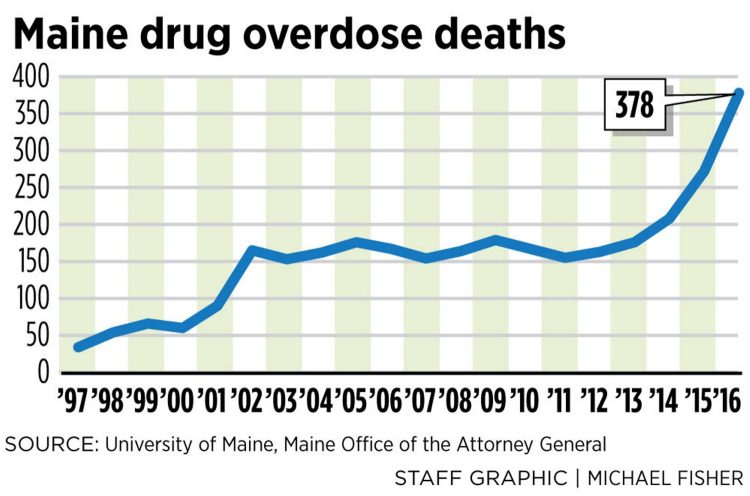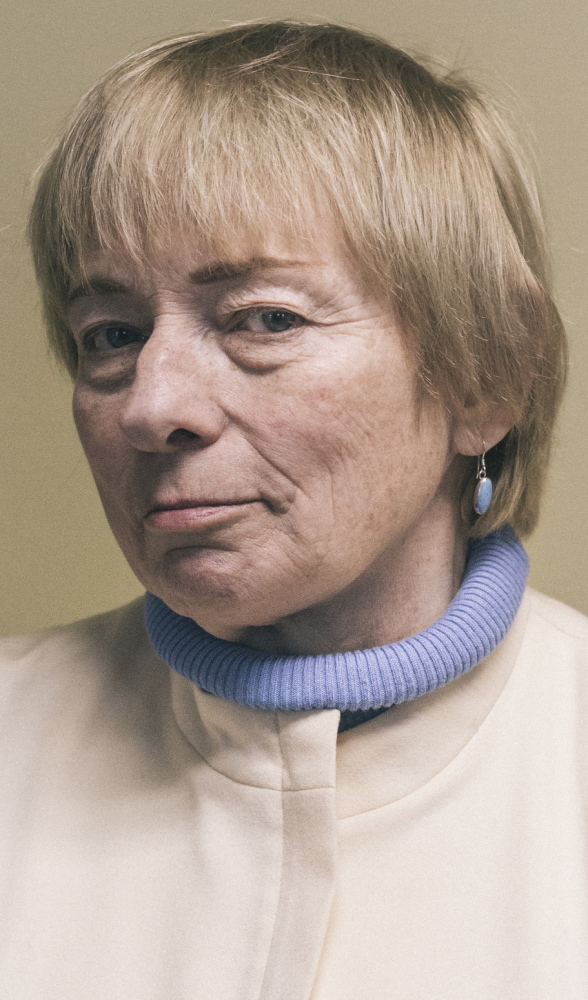Maine overdose deaths climbed for the fifth straight year in 2016, soaring nearly 40 percent to claim a record 378 people and signal a deepening of the state’s drug crisis.
Opioid drugs, especially fentanyl and heroin, caused most of the deaths, according to figures released Thursday by the state Attorney General’s Office. The 378 fatalities surpassed the previous record of 272 set in 2015.
“We need to reach out to friends and neighbors and let them know that whatever is wrong in their lives, no drug is going to solve their problems, not for one second,” Attorney General Janet Mills said in a news release. “They are only hurting themselves, their friends, family and community. We have to remove the stigma from addiction so that people will get help before it is too late and we have to provide more pathways to recovery.”
Nationally, more than 52,000 people died from a drug overdose in 2015, the most recent year for which federal data is available. That is greater than the number of people killed in car accidents in the same year, about 35,000.
The federal Centers for Disease Control and Prevention has flagged Maine as a state in which opioid deaths are increasing significantly. According to the CDC, Maine’s per-capita rate of drug overdose deaths was the 13th highest in the nation in 2015.
In 2015, the five states with the highest rates of drug overdose deaths were West Virginia (41.5 per 100,000), New Hampshire (34.3 per 100,000), Kentucky (29.9), Ohio (29.9), and Rhode Island (28.2). Maine’s 2015 rate was 21.2 deaths per 100,000.
FENTANYL CONTRIBUTED TO 195 DEATHS
Opioids – including prescription painkillers, heroin and fentanyl – were the cause of 313 of drug deaths in Maine last year.
Mills pointed in particular to an influx of fentanyl, which was involved in more than half of all overdoses in 2016. More potent than heroin, fentanyl is often illegally manufactured and mixed with or sold as heroin. Fentanyl contributed to 195 deaths in 2016, a 127 percent increase over the previous year. Heroin or morphine were involved in 123 deaths.
The report from the Attorney General’s Office shows three-quarters of the people who died from heroin or fentanyl in 2016 were men. On average, the victims were in their late 30s.
“It’s an ongoing problem, and it seems to only get worse,” said Sen. Eric Brakey, R-Auburn, and the co-chair of the Legislature’s Health and Human Services Committee.
Brakey expects the Legislature to consider multiple proposals related to the state’s opioid epidemic during this session. He is sponsoring a bill to add addiction to opiates or prescription drugs to Maine’s list of qualifying conditions for the medical marijuana program.
“I’m very much a believer this is a problem we need to try to tackle from a treatment perspective,” he said. “We need to try to get people help where we can.”
HEAVY HUMAN TOLL, SEEKING SOLUTIONS
Rep. Patricia Hymanson, D-York, who is also a co-chair of the Health and Human Services Committee, spoke about the human toll the drug epidemic is taking.
“It’s a heartbreaking statistic,” Hymanson said. “It’s heartbreaking that each and every one of those numbers is a real daughter, son, mother, father, and that brings heartbreak to each and every family.”
Hymanson said the opioid problem needs to be addressed with collaboration from many groups, including law enforcement, medical professionals, educators and the recovery community.
“There is not one bill that is going to be the answer to this,” she said. “They all have to work synergistically.”
Samantha Edwards, spokeswoman for the state Department of Health and Human Services, described the attorney general’s report as disheartening.
“At the Department of Health and Human Services, we are faced daily with the reality of this epidemic,” Edwards wrote in an email. “Each year more than 1,000 babies are born drug-affected. More than 60 percent of the children coming into state custody are there because parental substance abuse is a risk factor.”
Edwards said the state is working on several initiatives to expand treatment options. As an example, she pointed to a December announcement that the department will direct $2.4 million to medication-assisted treatment for opiate addiction, which will create 359 new treatment slots for uninsured Mainers. She said it is the administration’s first major initiative that involves medication-assisted treatment, a combination of medication and behavioral health counseling.
“We are focused on providing proven, evidence-based treatment options to ensure the best possible results for the individual,” Edwards wrote. “If a Mainer needs and wants substance abuse treatment, we encourage them to call 211, where someone will connect them with a local treatment provider.”
OFFICIAL: SOLUTION EFFORT INADEQUATE
Martin Sabol, director of Nasson Health Care in Springvale, a clinic that offers care for low-income people, said 10 to 15 patients of the clinic have died of drug overdoses over the past two years.
Maine has not yet devoted enough money and effort to alleviating the opioid epidemic, Sabol said.
“We have the tools to prevent these deaths, but we don’t have the resources,” Sabol said. He said many who are addicted don’t have insurance, but they would if Maine expanded Medicaid. With insurance, there would be a funding model to pay for substance use treatment. Maine is one of 19 states that have refused to expand Medicaid under the Affordable Care Act.
Marte McNally, a behavioral health clinician at Nasson, said the opioid crisis is tearing holes in the fabric of Maine’s communities.
“It’s inexcusable,” McNally said. “Every one of these people have families or children. There is such horrible sadness.”
Staff Writer Joe Lawlor contributed to this report.
Megan Doyle can be contacted at 791-6327 or at:
mdoyle@pressherald.com
Twitter: megan_e_doyle
Send questions/comments to the editors.





Success. Please wait for the page to reload. If the page does not reload within 5 seconds, please refresh the page.
Enter your email and password to access comments.
Hi, to comment on stories you must . This profile is in addition to your subscription and website login.
Already have a commenting profile? .
Invalid username/password.
Please check your email to confirm and complete your registration.
Only subscribers are eligible to post comments. Please subscribe or login first for digital access. Here’s why.
Use the form below to reset your password. When you've submitted your account email, we will send an email with a reset code.